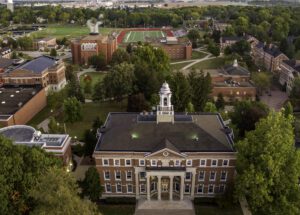In what’s been called the biggest election year in world history, more than 4 billion people – more than half of the world’s population – will participate in elections in 2024.
That makes Monmouth College’s Great Decisions program an ideal companion to better understanding what promises to be a most interesting year all over the world.
Sponsored nationally by the nonpartisan Foreign Policy Association, Great Decisions is a foreign affairs discussion series that will begin its 44th year at Monmouth on Jan. 31 when political science professor Michael Nelson presents about the High Seas Treaty, which was signed last fall by the United States.
“The Great Decisions program brings together faculty, staff, students and community members from all over western Illinois and sometimes Iowa,” said Nelson. “We have the opportunity to discuss a number of topics that are selected each year by the Foreign Policy Association. They allow us to dive deeply into issues that matter today in the world.”
The eight Great Decisions discussions this semester will be held at 7:30 p.m. on Wednesdays in Room 276 of the College’s Center for Science and Business. They are sponsored by the College’s Center for Civic and Social Change, which is directed by Nelson. It is free and open to the public.
Nelson said the issues scheduled for discussion range “from the environment and climate to artificial intelligence.” Monmouth faculty member Logan Mayfield will address the latter subject on March 20, after Great Decisions returns from two Wednesdays off around the College’s spring break.
“Having someone from our computer science department like him talk about the significance of AI on a deeper level is something you’re not going to typically get from some online news blurb,” said Nelson.
The first 30 minutes of each session is a presentation by that week’s guest speaker/moderator, followed by 40 minutes of robust discussion of the issue.
“That’s a great opportunity to ask questions to the person who’s delivering the talk, but also to get into a conversation with each other about why we care about these issues and understanding more deeply different people’s perspectives on them,” said Nelson.
Of the initial topic for this year’s program, the High Seas Treaty, which has been signed by more than 80 nations, Nelson said: “It’s a very significant treaty, both from an environmental but also from an economic perspective, because it talks about how the ocean’s resources are going to be shared amongst countries. That includes the valuable mineral wealth that’s underneath those seas.”
Significance of an election year
Great Decisions is held right during the heart of the political primary season and, this year, during the first months of the U.S. presidential election cycle.
“As we think about the importance of understanding foreign affairs and foreign policy for the next president, there are a lot of topics to consider,” said Nelson. “The Middle East is one of the topics we’ll be looking at (on Feb. 14, with faculty member Jessica Vivian). … It is very likely that the choice we will have this presidential cycle will be between two individuals who will have different approaches to foreign policy and different priorities. I think at least being aware of what we’re getting into is something that’s useful to voters.”
Other Great Decisions discussions at Monmouth College:
* Feb 7: “Pandemic Preparedness,” Blake Haas, kinesiology professor.
* Feb. 21: “Understanding Indonesia,” Petra Kuppinger, anthropology professor.
* March 27: “U.S.-China Trade Rivalry,” Saad Bashir, economics professor.
* April 3: “Climate Technology and Competition,” Brian Park, economics professor.
The Feb. 28 program is the lone departure from the Foreign Policy Association’s suggested topics, as it will feature three of the five students who traveled to Singapore last summer for three weeks to study domestic migrant workers in the Southeast Asian nation.
“It’s a really fun and informative discussion that we’re able to have with each other about all these key topics,” said Nelson of the longstanding College program. “I think that we have a community that has learned to be very respectful of each other and the different ideas that exist. I look forward to that each year as part of our discussion.”
Founded in 1918, the Foreign Policy Association was created as a way to “really encourage engagement by Americans in our foreign affairs and foreign policy, and to make sure that there’s great public education regarding those issues,” said Nelson.
***Courtesy of Barry McNamara, Monmouth College***








